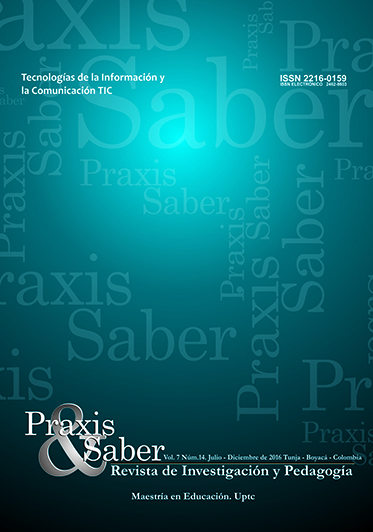Technology: a Challenge to exit the Risk?

Abstract
This article shows some transformations are experienced in the information age, in which methodological approach of phenomenological approach, analyzed and described and then discuss not only as technical devices and instrumental dimension but also examine their interrelationships as power and playback the capitalist system. In the first part, the relationship of concepts such as society, technology and culture evidence that life is based on the immediacy, immersion and speed of access in a technological world, bringing, multiple fractures that are here rethought from the educational perspective. In the background, entering the thematic discussion of the technologies in its context, namely, starting from the Fordism model to the conditions of teaching work linking higher education and technological innovation and the last part, it explains how to think and deal with technology taking advantage of their educational, cultural and political possibilities. In conclusion, the educational potential and technological objectives of the process is emphasized today.
Keywords
information technology, information society, education.
Author Biography
Juan Guillermo Díaz Bernal
Doctorando en Educación
References
- Baudrillard, J. (2005). Cultura y Simulacro. (A. Vicens, Trad.) Barcelona: Kairos.
- Bauman, Z. (2002). Modernidad líquida. (M. Rosenberg, Trad.) Buenos Aires: Fondo de Cultura Económica.
- Bauman, Z. (2008). Los retos de la educacion en la modernidad liquida. Barcelona: Gedisa.
- Beck, U. (2006). La sociedad del riesgo: hacia una nueva modernidad. (J. Navarro, Trad.) Barcelona: Paidos.
- Bianchetti, L. (2001). Da chave de fenda ao laptop: tecnologia difital e novas qualificações. Desafios para a educação. Florianopolis: Vozes.
- Briggs, A., & Burke, P. (2009). A social history of the media: from Gutenberg to the Internet. Cambridge: Polity Press.
- Campins, M. (2007). Sociedad y Estado en tiempos de globalizacion. Buenos Aires: Biblos.
- CASTELLS, M. (1998). La era de la informacion (Vol. 1. la sociedad en red). Madrid: Alianza.
- Chauí, M. (2000). Escritos sobre a universidade. São Paulo: UNESP.
- Debord, G. (2003). Comentarios sobre la sociedad del espectáculo. Barcelona: Anagrama.
- Deleuze, G. (1992). Post-scriptum sobre as sociedades de controle. En G. Deleuze, Conversações (P. P. Pelbart, Trad., p. 219 - 226). Rio de Janeiro: Editora 34.
- Drucker, P. (1992). The knowledge society: the age of discontinuity. Guidelines to our changing society. New York: Transaction Publishing.
- Dufour, D. R. (2007). El arte de reducir cabezas: sobre la servidumbre del hombre liberado en la era del capitalismo total. (A. Bixio, Trad.) Buenos Aires: Paidos.
- Foucault, M. (2009). Vigilar y castigar: nacimiento de la prision. (A. G. Camino, Trad.) Madrid: Siglo XXI.
- Johnson, S. (1997). Interface Culture: how new technology transforms the way we create and communicate. New York: Harper Edge.
- Kenski, V. (2008). Educação e tecnologias; o novo ritmo da infomração. Campinas: Papirus.
- Levy, P. (2007). Cibercultura: la cultura de la sociedad digital. (B. Campillo, Trad.) Barcelona: Anthopos.
- Luz, R. (2011). Novas imagens: efeitos e modelos. En A. Parente, Imagem - Maquina: a era das tecnologias do virtual (p. 49 - 55). Rio de Janeiro: Editora 34.
- Lyotard, J. F. (1999). La condición postmoderna: informe sobre el saber. (M. A.Rato, Trad.) Madrid: Altaya.
- Machado, L., & Ramos, F. (2005). ITIC2: Una propuesta metodologica de integracion tecnologica al curriculo. Bogotá: Universidad Pedagógica Nacional.
- Mattelart, A. (2007). Historia de la sociedad de la informacion. (G. Multigner, Trad.) Barcelona: Paidós.
- Negri, T. (2001). Exilio. (R. Cordeiro, Trad.) São Paulo: Iluminuras.
- Negroponte, N. (2006). A vida digital. (S. Tellaroli, Trad.) São Paulo: Companhia de Letras.
- Nicolaci-Da-Costa, A. (2006). Cabeças digitais: o cotidiano da informação. São Paulo: Loyola.
- Prensky, M. (2010). Teaching digital natives: partnering for real learning. Thousand Oaks: Corwin.
- Rifkin, J. (2000). La era del acceso. (J. F. Alvarez, Trad.) Barcelona: Paidós.
- Rueda, R., & Quintana, A. (2004). Ellos vienen con el chip incorporado. Aproximacion a la cultura informatica escolar. Bogotá: Instituto para la Investigacion Educativa y el Desarrollo Pedagógico (IDEP).
- SÁNCHEZ, C., M., & DEL SAGRARIO, C. C., F. M. (enero-marzo del 2012). La precarización del trabajo: El caso de los maestros de educación básica en América Latina. Revista Latinoamericana de Estudios Educativos, XLII(1), 25 - 54.
- SANTOS, B. D. (Octubro del 2002). Para uma sociologia das ausências e uma sociologia das emergencias. Revista Critica de Ciencias Sociais, 63, 237 - 280.
- Sennett, R. (2006). La cultura del nuevo capitalismo. (M. A. Galmarini, Trad.) Barcelona: Anagrama.
- Toffler, A. (1980). La tercera ola. (A. Martín, Trad.) Bogotá: Ediciones Nacionales - Círculo de Lectores.
- Vaillant, D. (2013). Integración de TIC en los sistemas de formación docente inicial y continua. Buenos Aires: Fondo de las Naciones Unidas para la Infancia (UNICEF).
- Vattimo, G. (1987). El fin de la modernidad: nihilismo y hermenéutica en la cultura posmoderna. (A. Bixio, Trad.) Barcelona: Gedisa.
- Wiener, N. (1988). The human use of human beings: cybernetics and society. Boston: Da Capo Press.